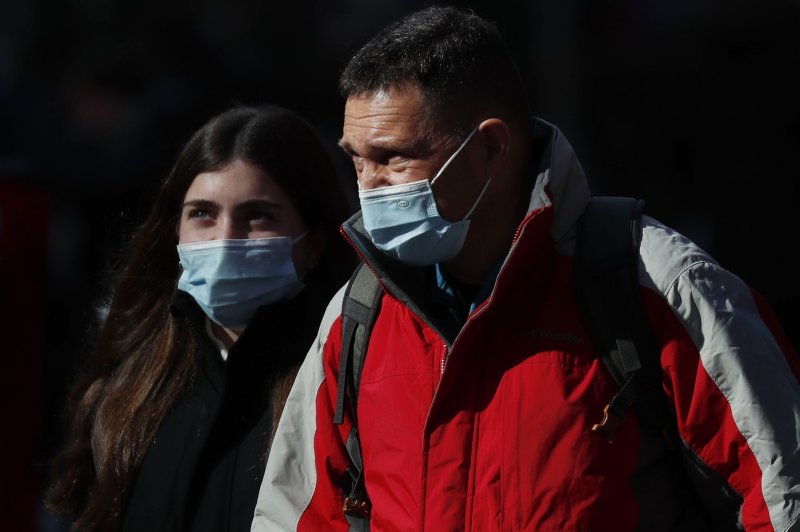1 of 4 | A recent court decision has led to the overturning of mask mandates across the country, leaving the decision to wear face coverings in public to individuals, Duke University experts said Thursday. File photo by John Angelillo/UPI |
License Photo
April 21 (UPI) -- Face coverings still help limit risk for infection in those vulnerable to severe COVID-19, experts said Thursday, three days after a federal judge struck down a government-imposed mask mandate for planes, buses and trains.
Although masks have been a "political issue" since the start of the pandemic in March 2020, "research has clearly shown that masks are bi-directional in their effects," meaning they protect both the wearer and those around them, infectious disease specialist Dr. Cameron Wolfe said on a call with reporters hosted by Duke University.
However, while this means that people at risk for severe illness from COVID-19 due to having a weakened immune system, such as those with cancer, can protect themselves by wearing a mask, "their risk is not zero" if people around them are unmasked, Wolfe said.
This could make travel complicated, now that airlines have removed mask requirements on flights in the aftermath of the federal court decision, according to Wolfe.
It could also present challenges for those who rely on public transportation to get to and from school or work, as the court decision said local masking requirements for trains and buses exceeded the authority of the Centers for Disease Control and Prevention, he said.
"I'm not a legal scholar," said Wolfe, an associate professor at the Duke University School of Medicine. "I always find it difficult to be diplomatic when public health guidelines fall into legal disputes."
He said he still recommends that his patients, particularly those who are immunocompromised with underlying health conditions, wear masks, "particularly on longer flights" and on other forms of public transportation.
The questions about mask mandates come at a time when a new subvariant of the virus that causes COVID-19, Omicron BA.2.12.1, is "really starting to take off in the United States," Wolfe's colleague, David Montefiori, said on the call.
"It is already becoming the predominant variant in many parts of the country, including New York City," said Montefiori, a professor and director of the Laboratory for AIDS Vaccine Research and Development at Duke University Medical Center in Durham, N.C.
"The good news is that these variants are not causing more severe disease and, as far as we can tell, the vaccines are still very effective against them," he said.
Still, all forms of Omicron BA.2, including BA.2.12.1, are more contagious than earlier strains of the virus, including Delta, which surged across the United States in 2021, and the original strain first identified in Wuhan, China.
This increased transmissibility has led to an upward trend in infections nationally, from an average of 25,000 cases per day in mid-March to more than 50,000 per day through Tuesday, based on CDC data.
These numbers are likely a "significant underestimate of the burden of COVID-19" across the country because use of at-home tests is increasing, Wolfe said.
Despite the rise in cases, however, there has not been a corresponding spike in hospitalizations or deaths -- at least not yet -- due to "pre-existing immunity" from prior infection with the virus or vaccination, Montefiori said.
This could change, though, if people allow their immunity to "wane," or decline, by not getting a booster dose of a COVID-19 vaccine," he said.
Through Wednesday, 219 million people in the United States were considered fully vaccinated, meaning they had received both doses of either of the Moderna or Pfizer-BioNTech shots or the one-dose Johnson & Johnson vaccine, the CDC reported.
However, fewer than 100 million of them received a third booster dose, even as federal health officials are recommending a fourth one for older adults and those with compromised immune systems, the CDC said.
"Not enough people have been boosted," Montefiori said. "Everyone will want to get second booster [at some [point] ... because of waning immunity."
Even if the United States sees a rise in severe illness -- and hospitalizations -- from COVID-19 with new variants, health officials are "more optimistic" that they can "handle surges in patients should they come" than they were earlier in the pandemic, Wolfe said.
This is due to higher rates of vaccination and because hospitals and health systems have learned how to manage severely ill patients over the course of the pandemic, even though not all of them will respond well to available treatments, he said.
Provided people receive booster doses of the vaccines, and the virus continues to evolve in a way that makes it less lethal, as the new Omicron strains appear to be, COVID-19 could finally become more like the cold or flu in terms of its public health impact, Montefiori added.
"The virus is always going to with us and we're going to have to learn to live with it," he said.















